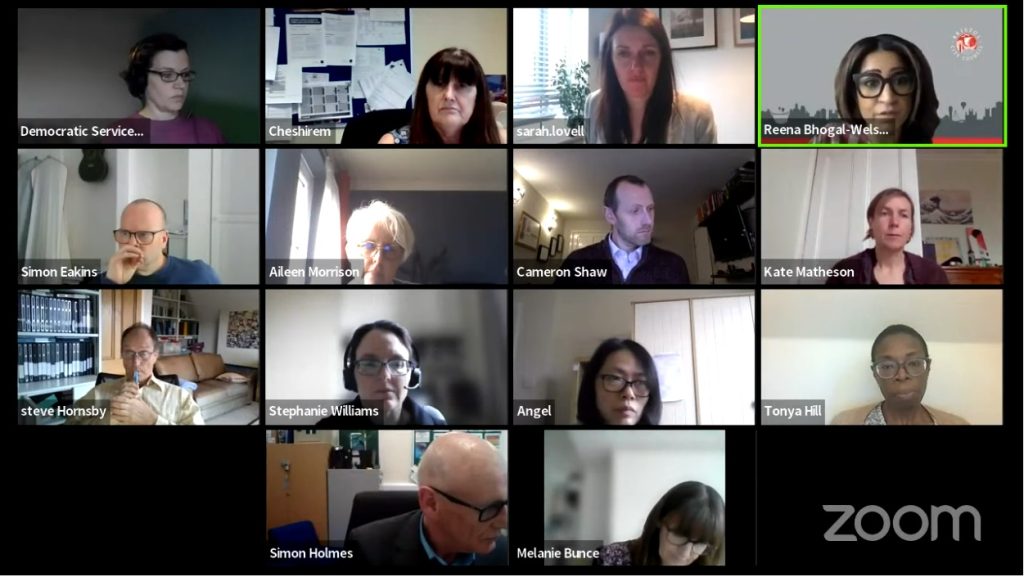Bristol Schools Forum and MP Joins Autism and ADHD Assessment Row
A Bristol MP has responded to community concern regarding new Crisis Criteria for autism and ADHD assessments. Labour MP for Bristol East, Kerry McCarthy, responded to an email from a Bristol occupational therapist regarding the new changes restricting access to community paediatrics by releasing a letter from Lorraine McMullen, Associate Director for Children’s Service at Sirona Care and Health.
The resident posted the exchange anonymously on Twitter, particularly commenting on Sirona describing ‘children at the lower end of the needs spectrum’ as “extremely patronising and dismissive.”
The undated letter references an MP and Bristol North Somerset and South Gloucestershire Integrated Care Board (ICB) session on the 03 March, which was held to help members understand the changes to the autism and community paediatric service.
As well as the letter, the Twitter user posted a response from McCarthy, who said in a covering email ‘At the briefing I did explain some of my concerns about children who have not yet been referred, despite some already struggling with visible difficulties in education due to undiagnosed neurodivergence for many years.’
Continuing, she expressed concern that children won’t be seen until ‘educational placement or family relationships have broken down’. She also said she shares ‘concerns’ that the criteria will impact girls who are likely to ‘internalise their distress’ and struggle to get support.
McCarthy said she would ‘continue’ to keep in touch with Sirona and the ICB as well as Bristol City Council, to see if ‘anything at all’ can be done to change or ‘amend’ the criteria.
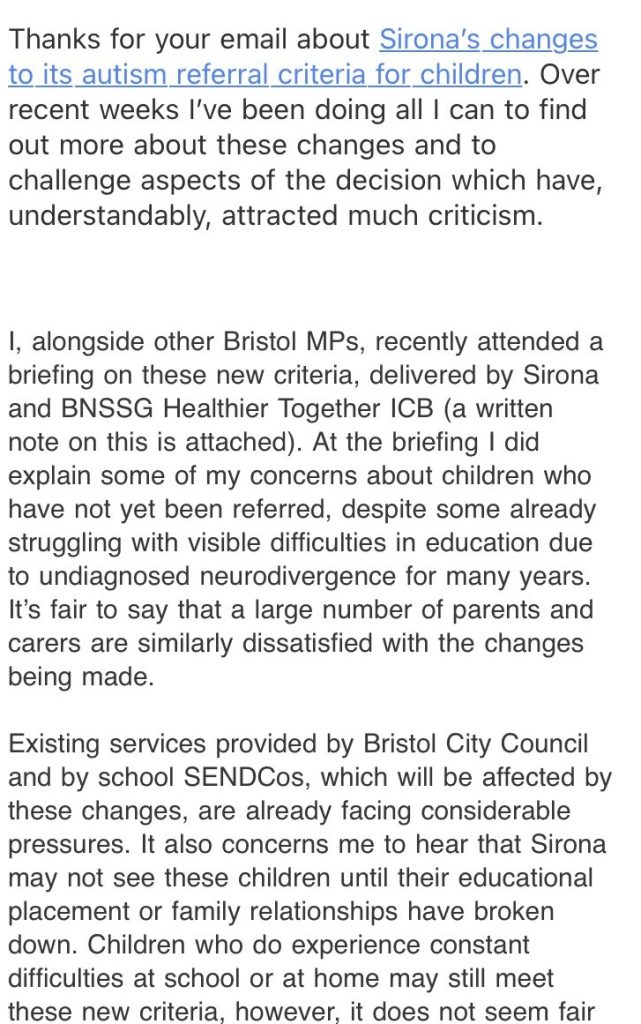
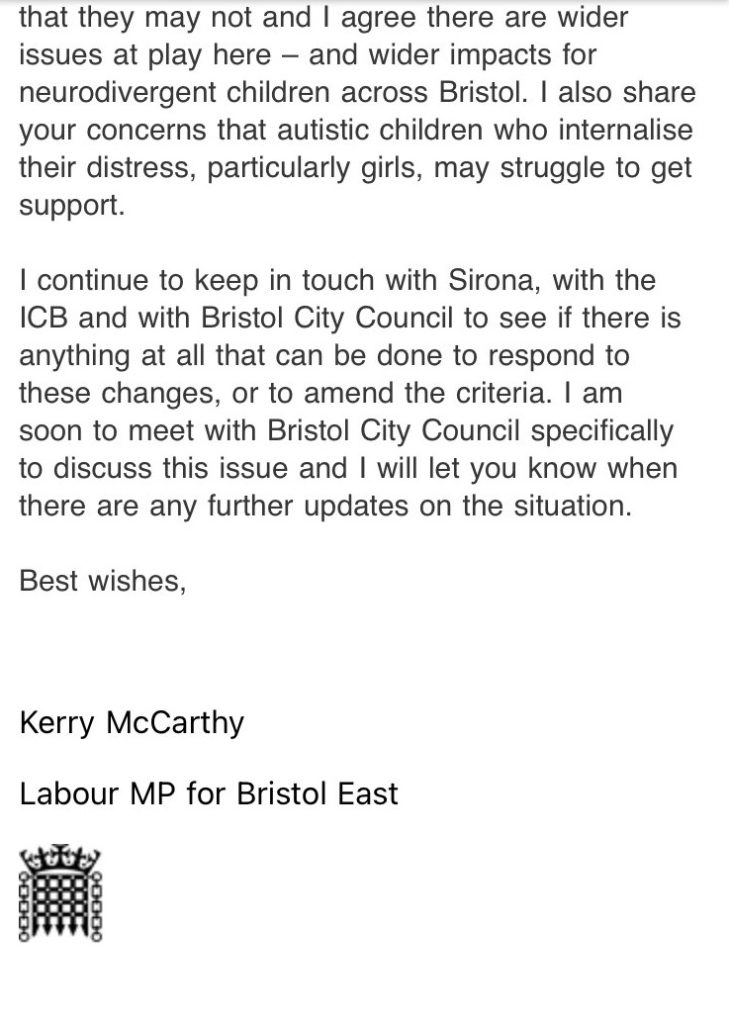
Email from MP Kerry McCarthy
Author of the published letter, Lorraine McMullen, Associate Director for Children’s Service at Sirona care and health, said that although there is a ‘national shortage’ of paediatricians and speech and language therapists, vacancy rates in the area are not as bad as other areas, but the ICB area was still in a position ‘of having less than we need.’
Under the ‘old criteria’ which was ‘very open’ and described as encouraging referrals for ‘all children whose needs may be associated with autism’ the new criteria was changed so that ‘resources can be directed’ towards children and young people with the ‘highest clinical need or are the most vulnerable.’ This, McMullen says, brings them in line with other services across the rest of the country.
McMullen said: ‘There is a limited resource with the Autism and Community Paediatric Services and it is important that we do not continue to accept more children and young people than we can see and assess. As the waiting lists have grown it has been harder to work efficiently and effectively. The new referral criteria have been designed to gain control and ensure those with the highest need are supported.’
According to Sirona’s data, there is a ‘considerable backlog’ in the number of those currently waiting and it will be ‘some time before the full impact will be seen.’
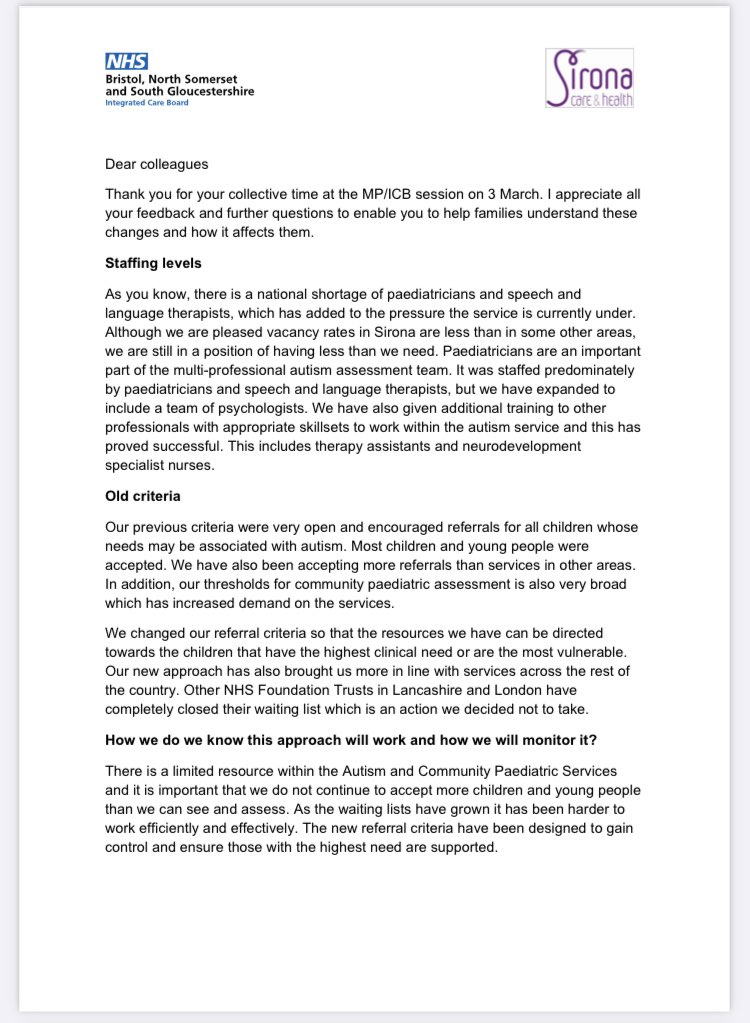
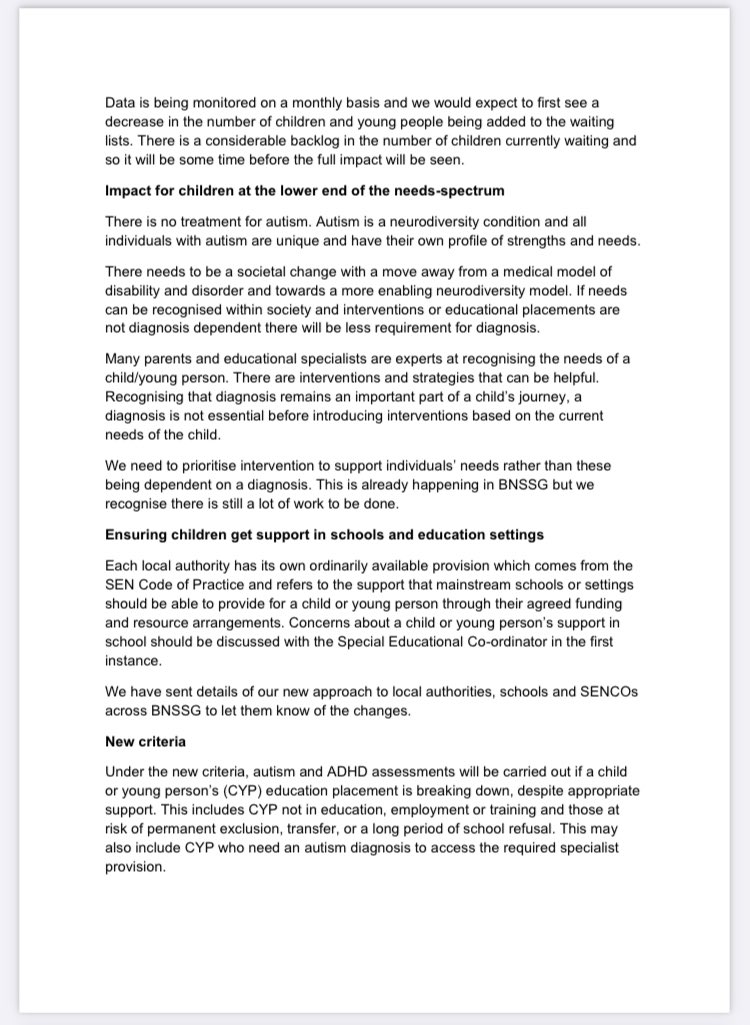
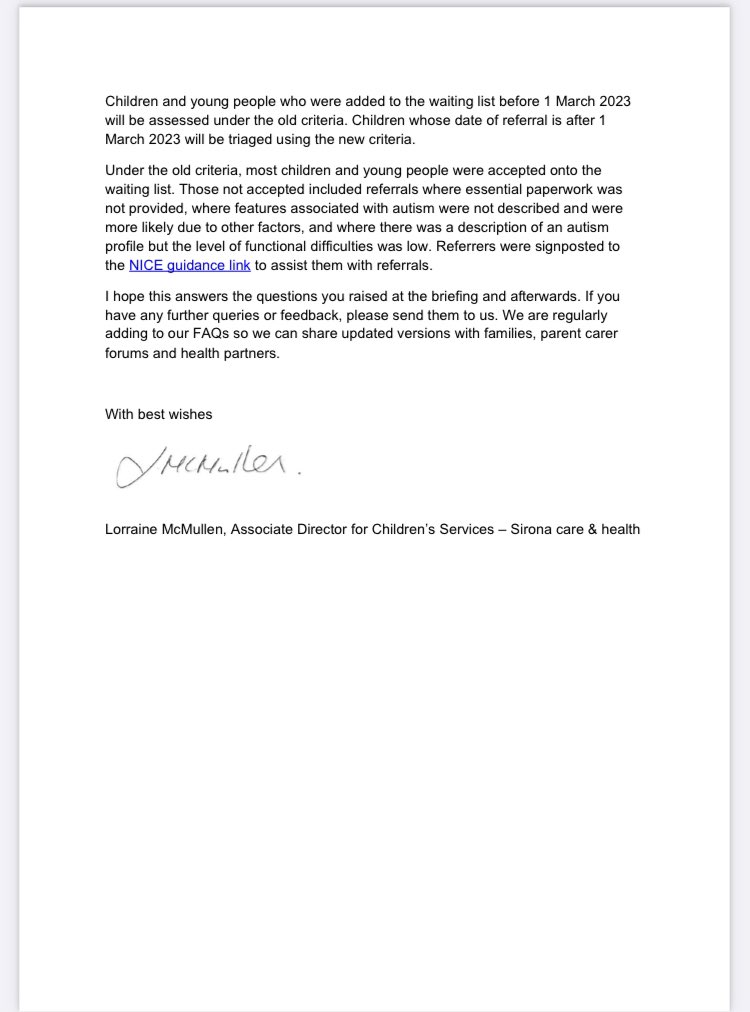
Despite autism being a spectrum condition with areas of need ranging in severity across its different facets, McMullen headed one section for autistic children ‘at the lower end of the needs-spectrum’. This phrase attracted the ire of the occupational therapist publishing the letter. Although McMullen contradicted this in the next paragraph describing autistic individuals as ‘unique’ with different ‘profile of strengths and needs’, the blunder has further upset families of autistic children.
In the letter, McMullen also used another outdated term – ‘school refusal’ – which has been dropped by the Send community as well as with professionals such as educational psychologists. The term suggests that the child experiencing difficulties accessing their education is making a choice not to attend school rather than simply being unable to due to systemic barriers and disability discrimination.
McMullen says: ‘There needs to be a societal change with a move away from a medical model of disability and disorder and towards a more enabling neurodiversity model. If needs can be recognised within society and interventions or educational placements are not diagnosis dependent there will be less requirement for diagnosis.’
In Twitter discussion, the occupational therapist said: ‘The question of do we need labels and diagnoses is complex and not something for a health provider to make decisions on. Cutting assessment services by 60% will not make a more supportive society for autistic and ADHD people…’
Bristol Reclaiming Independent Living said: ‘Regardless of what the legislation says, or children’s & adults services claim, it’s almost impossible to get support without diagnosis. Even then, a battle. This is the reality. Bristol is led by the agendas of commissioners, services and government. Not people needs.’
McMullen’s letter says that concerns regarding support a child needs in school should be taken to Special Educational Needs and Disabilities Co-ordinators (SendCo in the ‘first instance’.
To ensure children are getting the right support in education settings, McMullen says: ‘Each local authority has its own ordinarily available provision which comes from the SEN Code of Practice and refers to the support that mainstream schools or settings should be able to provide for a child or young people through their agreed funding and resource arrangements.’
Bristol City Council says its Ordinarily Available Provision (OAP) document is the ‘resources and support we expect to be available for children and young people with SEND in mainstream education settings. This information is for parents and carers of children with SEND, and the professionals who work with them.’
Former Director of Education, Alison Hurley says in the document’s introduction: ‘Timely identification and well planned support is essential if we are to work together to secure the best outcomes for Bristol’s children and young people with SEND.’
The document goes on to describe itself as ‘the provision that the local area expects to be made available for children and young people (CYP) with special educational needs and/or disabilities (SEND) in all local mainstream schools and settings. This is referred to as setting-based SEND support or the school and setting based stages of the graduated response. Bristol is a needs-led city: This means that any provision or support should be provided in line with the needs of the young person and is not dependent on any formal diagnosis.’
Bristol City Council’s OAP features areas of need broken down in the way you would see in an Education Health Care Plan (EHCP): Cognition and Learning, Communication and Interaction, Social Emotional and Mental Health, and Sensory and/or Physical Needs.
The lack of need of a diagnosis for support is clearly specified in Cognition and Learning: ‘For all areas of need any provision or support should be provided in line with the needs of the child or young person and is not dependent on diagnosis.’
And it’s also specified in Social Emotional and Mental Health Need: ‘For all areas of need any provision or support should be provided in line with the needs of the child or young person and is not dependent on diagnosis.’
But for Communication and Interaction, which would be a big part of autistic need in education, it does not say anything about a diagnosis being unnecessary. Neither does Sensory and/or physical Need.
The Bristol Autism Team (BAT) is listed as ‘resources advice and consultation’ available for children and young people in the OAP. But BAT only supports those with a ‘formal diagnosis and those on the pathway to diagnosis’, both of which are now inaccessible to many of the city’s autistic young population.
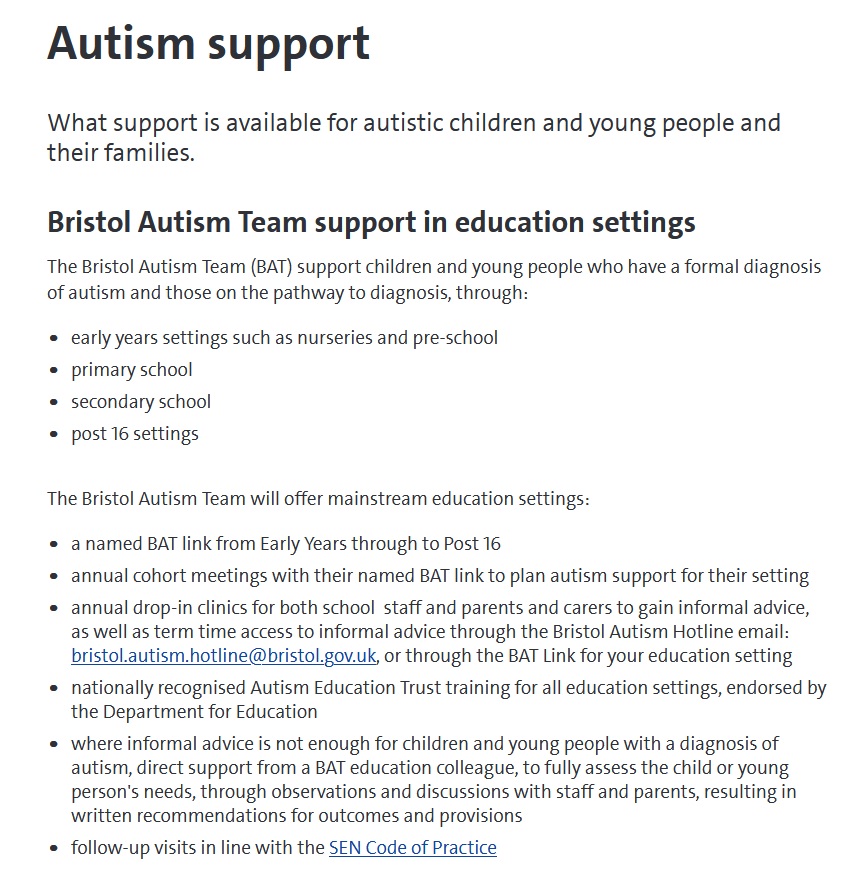
McMullen continued: ‘Under the new criteria, autism and ADHD assessments will be carried out if a child or young person’s (CYP) education placement is breaking down, despite appropriate support. This includes CYP not in education, employment or training and those at risk of permanent exclusion, transfer, or a long period of school refusal. This may also include CYP who need an autism diagnosis to access the required specialist provision.’
Headteacher of St Philip’s Marsh Nursery School, Simon Holmes raised concerns around the restricted referral criteria with Director, Education & Skills, Reena Bhogal-Welsh at Bristol Schools Forum this week.
He asked: “One of the things that sort of concerns us, and I think I’ve raised it before, is the amount of time parents are having to wait to see a paediatrician or speech and language. And I think the thing that just came through about basically closing down the referral system for children with autism.
“So you can’t even get on the waiting list. Now those children are coming into schools. We have lots of, I think everyone would agree with me here, in the schools we’re seeing more children coming in with more need than we have in the past. There’s obviously complex reasons for that. But it seems like, I think it was Sirona, they did this whole thing and there wasn’t a consultation from what I read, with the local Authority about it, and the impact that was going to have on parents and schools.
“Now one of the things that Bristol has been asked to address by Ofsted is relationships with parents around Send. I don’t see how this kind of thing is going to help where basically you can’t get a referral. You can’t put these children, you know this, where do they go. And there was a big question and answer thing came out, you know, for things to ask. But most of the answers are – sorry we can’t tell you. And I read that I was thinking, well how are we in this situation where this can happen. I think that is to do with how we join up with the different Services. How we work together. How they support us.
“But it’s even this whole thing went through without anyone in the local Authority knowing about it. I thought you know, these things are all impacting on real children and families now and then there’s the children that are coming through our doors. And these are the people that we’re talking to every day. And now having to say well we can’t refer your child there is no pathway for them. I just wondered if there was any kind of feedback on that?
Bhogal-Welsh paused for a long time before responding: “I can’t speak on behalf of Sirona, Simon.
“But it has impacted us,” Holmes replied.
“It has impacted schools and it is impacting parents.”
Bristol Schools Forum Chair, Sarah Lovell said: “I think what we can do Simon is note that you’ve raised it and then we’ll take it off outside of this meeting to follow up as appropriate.”
Forum member Jo Kingston added: “I was really just trying to raise the same the same query that Simon had for mainstream primary school. We are seeing an increase in children coming from nursery with high needs and additional needs. I think we are still in a post-Covid world and the impact is still ongoing and we are going to see that for our cohorts going all the way through. And we don’t know when that will end.
“And you know, we, like Simon said, the fact that we’ve been told that basically we can’t refer any children now on the pathway, so there won’t be any professionals coming in to work with those children, that means then that we’re not able to get the evidence to put to Top-Up panel to get the additional funding to support the children that need it.
“You know, then the implications on staff who are then working with children who have additional needs and are on the front line and that’s why there’s a retention crisis. Because you know, staff are coming into work and they are being hurt every day in work you know. And this, the support from specialist provision isn’t there because the resources aren’t there, the financing isn’t there and so it seems to be a circular situation. And you know, saying we’re going to reduce the amount of children who are, reduce the amount of high needs funding. I agree with Simon really, is probably going to create more problems in the short term and could lead to less retention of Staff in mainstream settings.
“You know with regards to sending children to Independent settings, the places weren’t there. They haven’t been there in the local Authority they haven’t been there. I had a pupil who waited five years and they’re now taking their taxi to Stroud every day to specialist provision. And of course, nobody wants that. But you know like Steve was saying, if there was any indication of the extra places that are now available so that we’re more aware of that. And what you know with the belonging the same programme, how far that’s progressed, where the additional places are going to be? What the focus of those additional places? And for instance SEMH. There’s a massive need for SEMH provision. And some update on where we are with that would be really useful.”
Bhogal-Welsh said she would bring an update on specialist places to the next schools forum meeting. No further discussion around the referral criteria was made.
More Bristol News from Chopsy Bristol
Twitter: https://twitter.com/ChopsyBristol
YouTube: https://www.youtube.com/user/chopsybaby
Instagram: https://www.instagram.com/chopsybristol/
Facebook: https://www.facebook.com/chopsybristol
For Theatre News: https://backstagebristol.com

